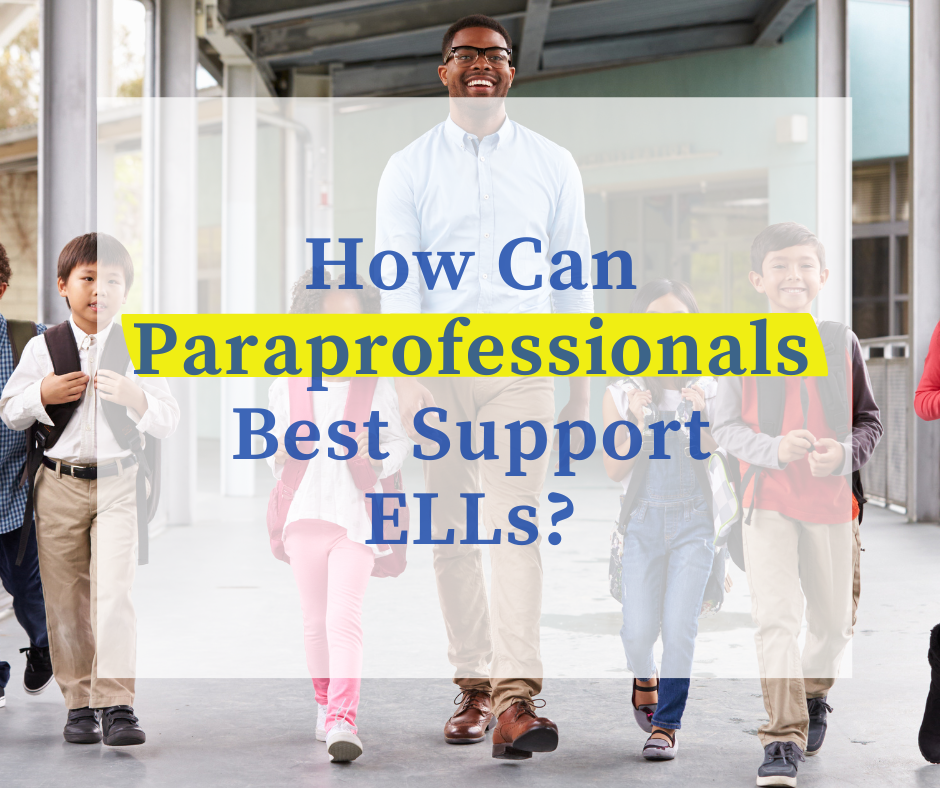We are right in the middle of a series called Small Steps to Success for ELLs! Throughout this series, we are encouraging every person in our schools, from the front office to the cafeteria, to take vital steps to help support our English language learners. We know when each person does this, you will see a change happen in your school, in the environment, the attitude, and in the mindset of the teachers, staff, and students!
Today, I want to give a huge shout out to our paraprofessionals! You are a vital piece of the school and a huge key to helping our ELLs find success. So today, let’s hit on five different ways you, as a paraprofessional, can support your ELLs!
Out of college, my first position was as a paraprofessional! I had always wanted to be a teacher, and after receiving my degree in Elementary Education (K-9) with a variety of different endorsements, there were no teaching jobs available. I was living in the northwest suburbs of Chicago, and it was very difficult to get a job. For every one or two positions available, there would be thousands of applicants. I wasn’t prepared for this! I had waited my entire life to become a teacher. After the school year started, I was thankful to be offered a position as a paraprofessional in a first and second grade special education class. The majority of the students I was serving were English Language Learners. It was an incredible opportunity, and I am so thankful that I was able to start with this position.
Let’s dive in and talk about 5 important ways paraprofessionals can support ELLs!
1. Build connections and relationships outside of the classroom.
I believe this the best way you, as a paraprofessional, can support your ELLs! When I was a paraprofessional, my work day started when the school day started, and I was off work when the bell rang that afternoon. During my work day, my job was simple: pour into the students and help the teachers however I could. As a paraprofessional, I didn’t have a lot of the extra things (lesson planning, data collection, P/T conferencing, etc.) that can really take up so much of the teachers time. I want to encourage you in this role; as a paraprofessional, you have an opportunity to connect with the students in ways that homeroom teachers and ESL teachers do not have the capacity. We know that a lot of bullying happens during unstructured parts of the day: in the cafeteria, the hallway, at recess. As a paraprofessional, I was assigned recess duty, lunch duty, and bus duty. I was able to be on alert for the newcomers who might not know where they’re supposed to be going next and help guide them. When a newcomer is stressed because they don’t understand the cafeteria worker who is telling them they do not have enough money in their account… Paraprofessionals, USE these opportunities. Be the person they know they can trust, so they will come to you when they need help.
2. Help them stay on track in the classroom.
When you are walking around the classroom, you may think, “Ok, students are open to page 82 of their math books. I need to quickly check in with my newcomers, or my level one and two students, and make sure they are on the right page.” We know that far too often, if a student has missed the initial introduction, they are lost for the remainder of the lesson. It’s often incredibly difficult for ELL students to track with the teacher. In addition to checking in on page numbers, be sure to see that they have all of the correct materials out, etc. This simple help can have enormous benefits for our students.

3. Differentiate instruction.
Communicate with the classroom teacher about how he or she envisions you working as a team. When it is time for the students to work independently, reteach, reexplain, rephrase the lesson. You might give them some of words in their native language. Check for comprehension by asking them specific, open ended questions. You can also provide scaffolds. You may provide a word bank, a sentence frame, or pictures of important vocabulary. Find two or three scaffolds that you can have in your back pocket, ready to use! In this way, your role is almost that of co-teacher.
4. Work with small groups.
Ask your cooperating teacher for resources you can use with a small group. Recently I’ve been volunteering in my daughter’s classroom. We are doing activities with high frequency words; with very little prep and a small block of time, we can offer beneficial support. If you find a content area you’re especially interested in, share this with your cooperating teacher! If you need scripted newcomer lessons, with all materials ready to go, our Newcomers Bundle is a great place to start! When you introduce new ideas and take initiative, your cooperating teacher and your students will be so grateful.

5. Offer support in their native language.
If you speak the same language as your students, you can translate during conferences and parent phone calls. Perhaps even more beneficial, you can better connect with your students. Get to know your students out on the playground, talking in their native language! If you do not speak your student’s native language, but you have an iPad with you, you can pull up Google Translate when permitted by the teacher. Sometimes allowing a translating device for even one lesson can help to engage a student and help them feel welcomed.
If you are a paraprofessional, I hope that you are EXCITED about the many opportunities you have to help ELLs succeed! And if you are a classroom teacher, please share these tips with the paraprofessionals in your building.
Again, I want to encourage you to find one way this week that you can make a relational connection with one of your students or help a student take a step forward in their learning. Remember that these small steps make a big difference in the lives of our English Language Learners. Connect with me on instagram, and share the different ways that you are taking those small steps!
We are cheering you on!
– Beth and the IYL Team




